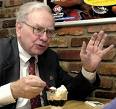
Financial markets feature a phenomenon called “herding.” This is when investors mimic each other. Perhaps this is so because when times are bad, misery loves company. And when times are good, they can party.
The phenomenon upends one of the maxims of economics. Convention has it that the big guy can’t move without having prices move against him. When he buys, the market takes notice and the price rises; and of course when he sells, the price declines. For the big guy, it should be difficult to “buy low, and sell high.”
And yet, two of the biggest guys in investment are Warren Buffett, an individual investor, and PIMCO, an asset management company. They both have a very good record of performance. For them, the profits seem to come fast and easy, at least in my view.
Why is this?

When these two big guys move, they can’t hide, so they tell the world what they do. Buffett periodically reveals his portfolio choices. PIMCO, just today, made a prediction that the US dollar will fall (and presumably, if they believe what they say, they are net short the dollar).
Since other investors follow these two big guys, what they buy will subsequently go up, and what they sell will subsequently fall. When they decide to close out their positions, they will have made a nice profit, all because the lemmings do what they do.
Of course, they can’t make very weird choices. Their credibility to the herd would suffer. So long as there is a mildly credible story behind their portfolio picks, the game goes on.
It is also possible that Buffett or PIMCO will make wrong calls. But because of herding, their losses will be smaller than those of others.
Doesn’t that make you feel that life in the financial markets is very unfair?
I will update this post in about a week and month, to report on where the US dollar has gone. As of this writing, the dollar buys 94.343 yen, the Euro is worth $1.4108, and gold (100 oz FUTR) is quoted at $934.50 p.f.o.
Acknowledgment: This post was inspired by the ideas of Nassim Taleb. In effect, herding sets up a legal Ponzi that benefits Buffett and PIMCO.
Just found this post. It doesn’t think much of the great Warren (and I don’t mean Harding).
LikeLike
The PIMCO bubble-crash story on the dollar may have begun to unravel. Gold has recently dropped from new highs, though the yen is still strong. Euro-$ seems on a sideways move. On Dec. 8, the dollar buys 88.54 yen, the Euro is worth $1.4709, and gold is at $1,132.90. A bit more than a month ago, I thought it was time to start thinking about this herding story of Buffett-PIMCO. If they make the first “goodbye” move, they will precipitate the turnaround, so watch for stories “against” the dollar so they can quietly get out.
LikeLike
Here’s such a PIMCO story. Don’t say I told you so..
As of today Dec. 22, 2009, the dollar has risen since I last commented on Dec. 9. The dollar buys 91.13 yen, the euro is worth $1.43, and gold is down to $1,095.50.
PIMCO and Buffett must have been quietly closing out their dollar shorts. If not, they’re thinking up ways to engineer some more dollar weakness. Hoo hah! as Al P would say..
LikeLike
Today Feb. 3, 2010, the dollar buys 90.35 yen; euro is worth $1.3947, and gold is at $1,112.40.
LikeLike
Today Feb. 17, 2010, the dollar buys 90.14 yen; euro is down to $1.3765, and gold is at $1,120.30. The “European” debt crisis has set up a contagion mentality against the euro.
With the benefit of hindsight, it seems reasonable to say that the “dollar weakness” tale of Buffett-PIMCO ended around end-Nov. 2009. Since then the dollar has markedly and consistently strengthened against the euro; the dollar has risen from lows around 87 yen to 93 yen at year-end, but has given up some of its gains to the low 90 yen level.
Here’s my Chinese New Year fortune cookie special: Watch out for new “insights” and “pronouncements” from these two investors, but in the meantime, the herding game has become more uncertain. There seems to be a bear play on the euro because of the European debt crisis, and this may have its own momentum independent of what Buffett and PIMCO would like to see. Gold has held up because currency turmoil sets it up as a safe haven asset. But all this volatility does not bode well for the global economy, so it is wise to be skeptical about rosy recovery scenarios. There is much to be said for the Austrian idea that the maladjustments that led to the 2008 financial crisis have not yet been adequately fixed, what with the major industrial countries still coy about a thinly-disguised reversion to Glass-Steagall rules for the banks. The big banks must have a strong “undercover” lobby working to dilute real financial sector reforms in the G-7 countries. But so far Paul Volcker seems to have called out their game, and the U.S. may well lead the pack in getting its financial markets in shape. This bodes well for an underlying firmness in the dollar against other currencies as well as for economic activity in the U.S.
LikeLike